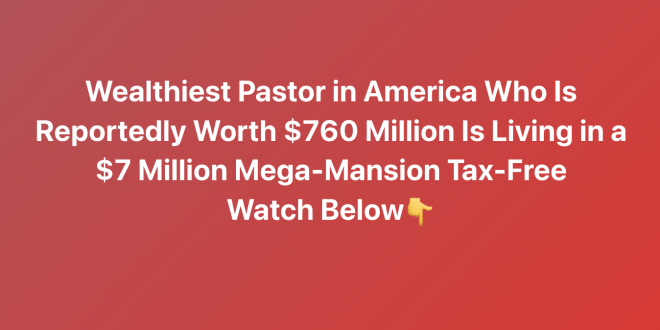Kenneth Copeland: America’s Wealthiest Pastor and the Controversial $7 Million Mansion
Kenneth Copeland, a prominent televangelist, is often cited as the wealthiest pastor in America, boasting an impressive net worth estimated at $760 million. His opulent lifestyle, particularly his ownership of a $7 million mansion, has ignited significant controversy. Located in an exclusive lakefront community near Fort Worth, Texas, Copeland’s sprawling 18,000-square-foot estate includes six bedrooms, six bathrooms, a tennis court, two garages, and a covered boat dock. This extravagant residence, officially owned by his Eagle Mountain International Church, has been the focal point of debates surrounding tax exemptions and the intersection of faith and wealth.
A Lavish Mansion with Minimal Taxes
Copeland’s mansion is situated on an acre of land, surrounded by 24 acres of picturesque lakefront property. While the estate’s market value is estimated to be in the millions, it was appraised at a significantly lower value of $1,250,000. This undervaluation results in annual property taxes of less than $3,000—a stark contrast to the approximately $150,000 that would be owed if the property were appraised at its true market value.
The reduced appraisal was part of a dispute resolution agreement with the Tarrant Appraisal District. Real estate experts argue that the waterfront property could fetch much higher prices in an open market. By declaring the mansion a “clergy residence,” Copeland’s estate qualifies for a full tax exemption. This designation allows religious organizations to benefit from substantial tax breaks, especially when properties are used for religious or clerical purposes.
Copeland’s Defense of His Lifestyle
Kenneth Copeland has consistently defended his luxurious mansion and overall lifestyle. In a 2015 speech at the Southwest Believers’ Convention in Fort Worth, he explained that constructing such an estate was a directive from God. He described it as a manifestation of his prosperity and a gift for his wife, Gloria. Completed in 1999, the property boasts impressive features, including a sweeping spiral staircase, a bridge spanning the living room, crystal chandeliers, castle-like doors, and even a ceiling projector in one of the bedrooms.
“You may think that house is too big. You may think it’s too grand. I don’t care what you think. I heard from heaven. Glory to God, hallelujah!” Copeland proclaimed during the convention, emphasizing his belief that his wealth and lifestyle were divinely inspired.
Controversies Surrounding Copeland
Copeland’s teachings, centered around the prosperity gospel—the belief that financial success is a sign of God’s favor—have been a source of ongoing debate. His refusal to fly commercially, opting instead for private jets to support his ministry’s work, has also attracted criticism. In a 2019 interview, Copeland stated, “It takes a lot of money to do what we do. We have brought over 122 million people to the Lord Jesus Christ.”
Critics argue that Copeland’s tax exemptions undermine the intended purpose of tax laws. Pete Evans, president of the Trinity Foundation, remarked, “The law was never intended to give breaks to millionaires and multimillionaires. You make a mockery of the law itself.” Such statements reflect broader concerns about the financial practices of wealthy religious leaders and the potential misuse of tax exemptions meant for modest clergy housing.
The Bigger Picture: Faith, Wealth, and Tax Exemptions
Kenneth Copeland’s lifestyle exemplifies the contentious intersection between religious faith, personal wealth, and tax exemptions granted to religious organizations. As America’s wealthiest pastor, Copeland benefits from significant financial advantages, including living in a $7 million mansion without paying substantial property taxes. His estate’s designation as a “clergy residence” allows for complete tax exemption, thanks to a discounted appraisal. This reduces his annual property taxes to less than $3,000, far below the $150,000 that would typically be owed for such a property.
While Copeland justifies his lavish lifestyle as divinely inspired and crucial for his ministry, critics contend that these privileges distort the spirit of tax laws designed to support modest clergy housing, not opulent estates. His prosperity gospel teachings further fuel the debate by promoting the idea that financial success aligns with divine will.
Broader Implications and Questions
This situation raises important questions about the use of tax exemptions by religious organizations and whether such benefits should extend to multimillionaire pastors. Watchdog organizations argue that these exemptions allow for personal wealth accumulation at the expense of public revenue. Copeland’s case highlights the need to balance religious freedoms with financial accountability in today’s society.
Key Questions:
-
- Are Tax Exemptions Being Misused?
- Should tax exemptions for religious properties be limited to modest residences, preventing the accumulation of personal wealth through church-owned properties?
- Transparency and Accountability:
-
- How transparent are religious organizations regarding their financial practices? Should there be more stringent reporting requirements to ensure that tax exemptions are not being exploited?
-
- Balancing Faith and Wealth:
- How can religious leaders balance the prosperity gospel with ethical financial practices, ensuring that their wealth does not overshadow their spiritual missions?
- Are Tax Exemptions Being Misused?
Community and Legal Responses
The controversy surrounding Kenneth Copeland’s mansion has sparked discussions among community members, legal experts, and religious organizations. Some advocate for stricter regulations on tax exemptions for religious properties, emphasizing the need for fairness and accountability. Others defend Copeland’s right to use his resources as he sees fit, arguing that his contributions to his ministry and community justify his financial status.
Legal experts point out that as long as religious organizations comply with existing tax laws, their property valuations and exemptions are legitimate. However, the debate continues over whether these laws need to be updated to address cases where wealth accumulation appears to overshadow the intended purpose of religious tax exemptions.
The Role of Watchdog Organizations
Organizations like the Trinity Foundation play a crucial role in scrutinizing the financial practices of televangelists and other wealthy religious leaders. By investigating and exposing potential abuses of tax exemptions, these watchdogs aim to promote transparency and accountability within religious institutions. Their efforts highlight the importance of oversight in ensuring that tax laws are applied fairly and that religious freedoms are not exploited for personal gain.
Public Perception and Media Coverage
Media coverage of Kenneth Copeland’s wealth and tax practices has significantly influenced public perception. Articles and reports highlighting his lavish lifestyle and minimal tax contributions have fueled skepticism and criticism. Public opinion is divided, with some viewing Copeland as a successful religious leader who uses his wealth to further his ministry, while others see him as an example of how religious tax exemptions can be misused to support extravagant personal lifestyles.
The media’s role in shaping this narrative underscores the importance of balanced and factual reporting. Accurate representation of Copeland’s financial practices and the context of religious tax exemptions is essential for informed public discourse.
Potential Reforms and Future Considerations
The controversy surrounding Kenneth Copeland’s mansion may prompt discussions about potential reforms to religious tax exemptions. Policymakers and legislators might consider:
-
- Revising Appraisal Processes:
- Implementing more stringent criteria for property appraisals to prevent undervaluation of high-value estates owned by religious organizations.
- Setting Limits on Exemptions:
-
- Establishing clear guidelines on the types of properties that qualify for tax exemptions, ensuring that only modest residences intended for clergy use are eligible.
-
- Enhancing Transparency:
- Requiring religious organizations to disclose detailed financial information related to property ownership and the use of church funds.
- Revising Appraisal Processes:
- Monitoring and Enforcement:
- Increasing oversight and enforcement mechanisms to ensure compliance with tax laws and prevent the misuse of exemptions.
Conclusion
Kenneth Copeland’s story is a striking example of the complex relationship between faith, wealth, and taxation. As America’s wealthiest pastor, his lifestyle and the financial practices of his ministry continue to spark debate and scrutiny. The controversy surrounding his $7 million mansion and its minimal tax burden underscores broader concerns about how tax exemptions are applied to religious organizations and their leaders. This case invites ongoing reflection on ensuring that religious freedoms are balanced with fair financial practices and accountability.
As discussions about tax reforms and transparency in religious organizations continue, Kenneth Copeland’s example serves as a catalyst for examining the broader implications of wealth accumulation within religious institutions. Balancing the prosperity gospel with ethical financial practices remains a critical challenge, highlighting the need for ongoing dialogue and potential legislative action to address these complex issues.
 Viral Hatch US/UK No.1 News Portal
Viral Hatch US/UK No.1 News Portal







